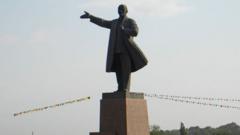Odesa, a critical cultural hub along Ukraine’s Black Sea, faces internal conflicts over its imperial Russian ties as it fights to shape its identity amid the ongoing war with Russia.
Cultural Struggles in Odesa: A City Divided Amidst War and Identity

Cultural Struggles in Odesa: A City Divided Amidst War and Identity
In Odesa, a cultural tug-of-war centers around the removal of imperial Russian symbols as the city grapples with its identity in wartime.
The statue of famed writer Isaac Babel, notable for his depictions of Odesa's diverse heritage, symbolizes this clash. While authorities aim to enforce a decolonization law to rid the city of Russian imperial influences, many locals argue that dismantling such monuments threatens to erase their historical narrative.
As the city endures the constant threat of drone attacks and missile strikes, the debate over Babel's statue ignites strong emotional responses from Odesans, who feel that their cultural soul is at stake. “You can’t remove Babel,” insists Antonina Poletti, a long-time resident and news editor. “If you remove him, you remove the soul of the city.”
This struggle illustrates the broader effort of Ukraine to redefine its cultural identity away from Russian dominance, raising questions about how history, memory, and identity can coexist in times of conflict. The ongoing war has intensified discussions about who and what should be celebrated in public spaces, as Odesa navigates a precarious balance between honoring its past and forging a new future. As the removal of the statue threatens to prompt further divisions, the question remains: how can this city preserve its rich multicultural legacy during such tumultuous times?
As the city endures the constant threat of drone attacks and missile strikes, the debate over Babel's statue ignites strong emotional responses from Odesans, who feel that their cultural soul is at stake. “You can’t remove Babel,” insists Antonina Poletti, a long-time resident and news editor. “If you remove him, you remove the soul of the city.”
This struggle illustrates the broader effort of Ukraine to redefine its cultural identity away from Russian dominance, raising questions about how history, memory, and identity can coexist in times of conflict. The ongoing war has intensified discussions about who and what should be celebrated in public spaces, as Odesa navigates a precarious balance between honoring its past and forging a new future. As the removal of the statue threatens to prompt further divisions, the question remains: how can this city preserve its rich multicultural legacy during such tumultuous times?




















